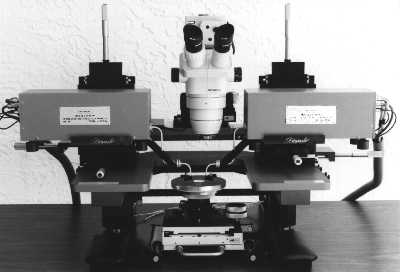The MODEL 50 PICOPROBE® sets new standards in microwave probing performance. Benefiting from coaxial techniques, which have inherent low loss and low dispersion characteristics, the Model 50 Picoprobe®, with or without the bias T option, achieves an insertion loss of less than 0.8 db (typical) and a return loss of greater than 15 db (max.) over its frequency range.
With its individually spring loaded, Beryllium-Copper tips, the Model 50 Picoprobe® provides reliable contacts, even when probing non-planar structures. This reliable low resistance contact is one of the keys to providing highly repeatable measurements (-55 db) at V band frequencies. The Model 50 Picoprobe® also provides direct viewing of the probe tips for accurate positioning.
Any pitch (tip spacing) from 50 microns and up may be specified. The probe can be configured with Ground-Signal-Ground (G,S,G), Ground-Signal (G,S), or Signal-Ground (S,G) tip footprints. We recommend smaller pitches with a G,S,G footprint for best performance.
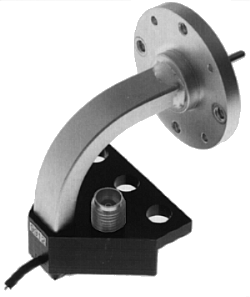
Model 50 PDF
- Durable 33 GHz to 50 GHz
- Insertion loss 1.0 db max
- Return loss 15 db max
- Individually spring loaded contacts
- Measurement repeatability -55 db
- Bias T option available
- Patented coaxial design
| Picoprobe® Model 50 Data | |
|---|---|
| Typical uncalibrated performance of a Model 50-GSG-100-BT while touching a 50 ohm load on our CS-5 calibration substrate | 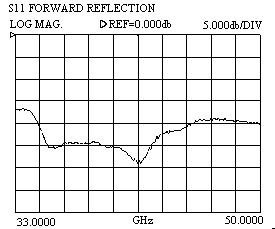 |
Typical insertion loss of a Model 50-GSG-100-BT |
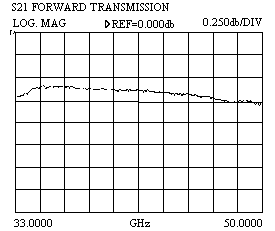 |
| The Model 50 Picoprobe® bias T provides a direct low resistance DC path for supplying up to 1.5 A to a device under test. The bias T also has special circuits which add loss at frequencies below the cut off frequency (26.34 GHz) of WR-22 waveguide. This data was taken by launching a, 40 MHz to 50 GHz, signal from the tips of a calibrated Model 67A into the tips of a Model 50-GSG-150-BT. Without this low frequency loss, most active devices will oscillate. | 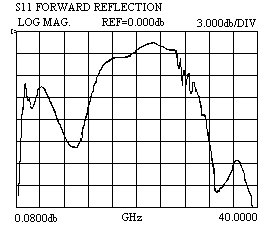 |
Micropositioners are available to hold Wiltron V band modules so that the module and the probe are micropositioned as a unit. In this way, total ease of positioning can be achieved with minimum insertion loss.
The probes also have a 3 hole mounting adaptor which will fit standard microwave probe stations. In this case, a longer section of waveguide may be desired to add positioning flexibility.
